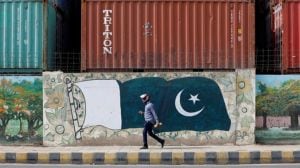Congress146;s daring gamble
The guardians of the country8217;s secular space and old-school Congressmen alike are aghast at the Congress poll strategy for Gujarat. In...

The guardians of the country8217;s secular space and old-school Congressmen alike are aghast at the Congress poll strategy for Gujarat. Instead of taking the high moral ground and focusing on Modi8217;s communal and hate-driven agenda, the party has targeted the BJP8217;s poor record of governance and mundane issues such as bank scams and the failure to provide water, electricity, security, etc.
Shankersinh Vaghela, a former RSS stalwart, has been chosen to lead the party in Gujarat and many other Congress candidates have a saffron tinted perspective. Congress president Sonia Gandhi launched her campaign from the Ambaji temple. Instead of giving due representation to minorities and other deprived sections, the Congress has followed the BJP8217;s example in allotting the lion8217;s share of tickets to powerful vested interests in the state 8212; the Patels and the creamy layer among the OBCs. It has fielded only four Muslim candidates. If the BJP has 46 Patels and 56 OBCs as candidates for the 182 assembly seats, the Congress has put up 41 Patels and 57 OBCs. Some, in fact, describe the Congress as the BJP8217;s B team. Others quip that while the BJP has sponsored VHP and Bajrang Dal men, the Congress has fielded BJP men.
The Congress8217;s strategy has been formulated by Kamal Nath, general secretary in charge of Gujarat, who has relied more on the advice of former Congress-baiters like Vaghela, Urmilabehn Patel and Narhari Amin, rather than party veterans like Ahmed Patel, Madhavsinh Solanki and Amarsinh Chaudhary. A Congress stalwart like Jinabai Darji is on the warpath and the Seva Dal chief has resigned. Many apprehend that the soft Hindutva line that has been adopted in Gujarat will tarnish the Congress8217;s secular image not just in the state but all over the country. They believe that the Gujarat election should have provided an opportunity for the Congress to reaffirm its commitment to the minorities, not to skirt the Hindutva issue.
But despite these misgivings, the blanket condemnation by intellectuals 8212; as was clear from a seminar on communalism in the Capital last week 8212; and the sneers by the BJP about imitation being the best form of flattery, Kamal Nath8217;s daring gamble seems actually to be paying off. Modi who assumed he could win the Gujarat elections hands down by demagoguery of the worst kind playing on the communal prejudices of the sharply polarised electorate, has been stopped in his tracks. The increasingly shrill tone of the chief minister8217;s speeches, the low turnouts for the speeches of the BJP leaders from Delhi and the desperate ploys adopted by the VHP, such as flaunting T-shirts with images of a burning coach, are all signs that the BJP is no longer confident of a sweeping victory. A month back, the BJP boasted that victory in Gujarat was a foregone conclusion, the only doubt being the margin of the Congress defeat. Now there is a very real apprehension that the Congress could turn the tables on it or at least ensure a photo finish.
By making Godhra his main selling point, the naqli Sardar, has probably underestimated the intelligence and the basic decency of the average Gujarati. The state has to decide whether Modi can ride to victory on the embers of a burnt bogey. The Congress has shrewdly avoided playing into Modi8217;s hands and refrained from engaging in a debate on his maniacal and nonsensical observations on terrorism, Godhra, Musharraf and Italians. Instead, it has asked Modi to respond to charges of incompetence. Congress campaigners while emphasising the difference between true Hindutva, where there is a genuine pride in one8217;s religion, roots and culture, and a false Hindutva, in which zealots whip up hatred in the name of religion for their own selfish ends, avoid touching on the Modi government8217;s shameful record in the communal riots. In fact, the minority community has been largely ignored in this campaign, which has been interpreted by some sections as cowardice and
a sell out.
But the party realises that pragmatism rather than dogmatism is required if it is to make headway in a deeply divided polity. It is a strategy that those who espouse the cause of secularism too stridently could do well to emulate. Sensitive communal issues are not resolved by grandstanding and speaking constantly in shrill confrontationist tones. We are not a Hindu state, but it is short-sighted and impractical to believe that the sentiments and wishes of the majority community and the minority communities can be treated entirely on par. Rigid posturing only leads to terrible backlashes and provides grist for those like Modi who thrive in propagating an agenda of hate and minority bashing. Considering the high stakes involved in Gujarat, one wonders whose cause those who seek to fragment the anti-Modi vote are serving. Laloo Prasad Yadav even joked in Parliament that the list of third party candidates was being provided by the BJP party office.
At times secularism, as practised by our political leadership, is more about appearances than actual reality. Unfortunately the barometer of secularism has come to be judged by superficial short cuts such as providing an additional public holiday for a religious festival, travel concessions for Haj, facilities for visas to the Middle East, grants to Urdu institutions and so on. The hollowness of such tokenism is illustrated by the way iftar parties in Delhi have suddenly gone out of fashion. Just a few seasons ago the easiest way for a politician to demonstrate his secularism was to be photographed at an iftar in the company of long bearded imams and mullahs. Even our prime minister felt it necessary to proclaim his secular outlook by donning what looked like an inverted tea cosy on his head at his annual iftar. The fact that this year both the BJP and the Congress have got cold feet over hosting iftars, suggests their motives in holding them in the first place were very shallow.
True secularism is not about empty and largely symbolic gestures, but about bridging the divisions and differences between communities. Not accentuating them.
- 01
- 02
- 03
- 04
- 05






























